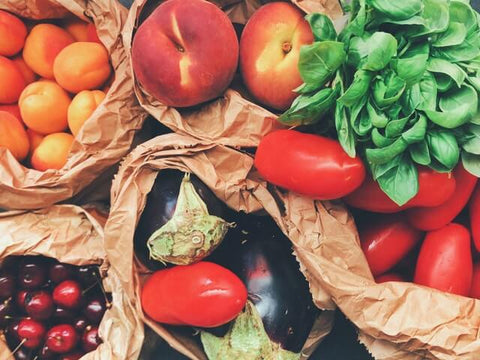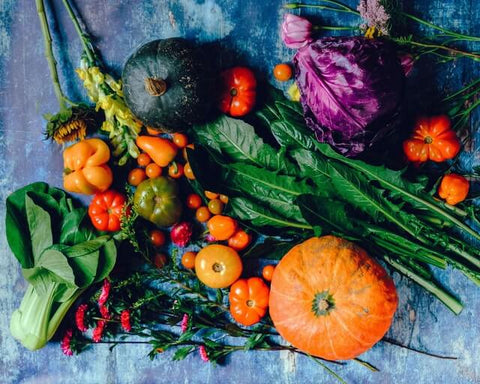
By Wen Liu • September 2, 2019
Every time you go food shopping, you have the choice between organic and conventional foods. If you have the extra budget, it’s worth it to choose organic.
You may not find as broad a selection of organic foods as conventional ones, yet you can still find them available in regular stores and even more abundant in specialty stores such as health food stores.
Plus, the range of organic choices online is ever-growing. Also, it’s possible to get better prices on organic products through means such as eCommerce stores like Opportuniteas, which don’t have the extra costs associated with running a physical location.
Despite any challenges, it may be worth going organic as much as possible, especially over 50.
Think of it as an investment in your health.
Consider these five reasons why women over 50 should go organic:
1 - You’ll reduce your exposure to deadly pesticides and toxins

Organic crops are not grown with the same chemical pesticides and fertilizers used on regular crops, so eating more organic foods reduces the amount of toxins you come in contact with.
This is one of the main benefits of going organic.
Even when the quantities of these chemicals used are considered safe, the amount you come in contact with can add up through repeated exposure and different products.
A literature review and meta-analysis in The British Journal of Nutrition confirmed that organic crops show a reduced incidence of pesticide residues as well as lower cadmium concentrations compared to nonorganic crops. The conventional crops had a four times higher occurrence of having residues from pesticides.
Consistent exposure to toxins can potentially have a significant impact on your health.
For example, cadmium can build up in your liver and kidneys. This is not good because cadmium is a toxic metal associated with causing cancer. Another example is the Roundup herbicide. There is not currently agreement on whether it is safe, but the World Health Organization’s International Agency for Research on Cancer considers it a “probable human carcinogen.”
These are just a couple of examples, yet you’re exposed to many other potentially harmful chemicals through nonorganic crops as well.
By eating organic as much as possible, you reduce your exposure to synthetic and artificial chemicals that could potentially be harmful to your health. You don’t necessarily have to only eat organic, but choosing as many organic foods as you can reduce your exposure to toxins and give yourself some peace of mind.
If you only want to mix some organic choices into your diet, consider following the Dirty Dozen list that shows you the conventional items with the most residue of pesticides. In these cases, it may be smart to switch to organic. Along with the Dirty Dozen list, there is a list of the Clean 15, which aren't as important to buy organic.
2 - You’re part of a vulnerable population

Buying organic can be more important for vulnerable populations of people whose bodies may not be able to handle exposure to toxins as well.
Over 50, you are considered vulnerable along with groups such as pregnant women and children. If you also have a degenerative disease, this could make you even more vulnerable to the effects of pesticides and other chemicals on conventional foods.
Research professor Charles Benbrook explains that in people over 50 and those with a degenerative disease, their bodies may not work as well to filter and remove pesticides or address effects of the toxins. Professor and director of Arizona State University’s Biodesign Center for Environmental Security Rolf Halden shared a similar view that vulnerable populations might be the people that get the most benefit from organic foods.
3 - You may get more antioxidants

Nutrition is important for everyone, yet as you age, it can be even moreso.
Proper nutrition can help you support all the body processes and systems that are gradually declining, such as organ function, bone health and brain function. It can also help with managing chronic health conditions and diseases.
Yet your appetite, metabolism and ability to absorb nutrients all decrease with age, which means it can be harder to get the nutrients your body needs to function at its best. For these reasons, it can be important to eat foods that pack as much nutritional punch as possible.
This relates to eating organic because organic foods may provide more nutritional value than conventional choices. There is a debate on whether this is the case and mixed results from research. Nonetheless, the review and meta-analysis mentioned in #1 in this list, which looked at 343 peer-reviewed publications comparing organic and nonorganic crops and food, found substantially higher levels of various antioxidants in organic crops and foods. The amounts varied by the type of antioxidant.
The researchers explained that many of these antioxidants are associated with a lower risk of chronic disease. That makes sense because this is what antioxidants are known for: they work to counteract oxidation, which when left unchecked can lead to cell damage and disease.
More research is needed to come up with a definitive answer of whether organic food provides more nutrition, but some of the research saying there is no difference has been criticized and may be limited in its methods while numerous studies have found a measurable difference.
4 - You might enjoy the taste more

After 50, it’s common for the senses of taste and smell to diminish, which is one of the factors that can lead to a reduced appetite.
Organic food is considered by some to taste better than conventional food. It’s possible that as your sense of taste goes down, the better taste of organic food will be more enjoyable.
At the very least, if a lack of taste causes you to eat less, you may get more nutritional value out of each bite of organic food to better support your body.
5 - You’ll consume better meat and dairy products

Organic options are not limited to plant foods. You can also choose organic meat and milk, which research has found to be healthier than its conventional counterparts.
Organic options in these food groups can have a better fat profile with a significant amount more of the healthy fats omega-3 fatty acids, which is associated with heart health. Plus, organic milk can have less saturated fat.
Another factor of eating organic meat is that you skip traces of the antibiotics conventional livestock are given, as well as synthetic growth hormones given to many animals. Organic meat does not contain these substances or synthetic hormones.
As a bonus, organic practices are better for the welfare of animals and the environment.
Overall, it's up to you whether to switch to organic completely or to incorporate some organic foods into your diet. While this food costs more, you could see it as an investment in your health that could possibly reduce some of your medical expenses. Since you're part of a vulnerable population that may benefit from organic foods more than others, it may be worth seriously considering making the switch--at least as much as possible.
If you could use some help with your diet, Opportuniteas is here for you. Contact us for a free 30-minute telephone consultation with a health coach who wants to help you reach your goals.




